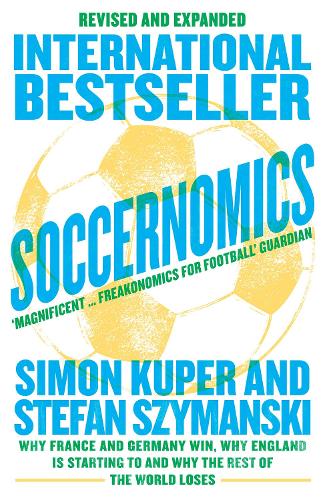
Soccernomics (2022 World Cup Edition): Why France and Germany Win, Why England Is Starting to and Why The Rest of the World Loses
(Paperback)
Publishing Details
Soccernomics (2022 World Cup Edition): Why France and Germany Win, Why England Is Starting to and Why The Rest of the World Loses
By (Author) Simon Kuper
By (author) Stefan Szymanski
HarperCollins Publishers
HarperCollins
19th April 2023
27th October 2022
United Kingdom
Classifications
General
Non Fiction
Popular economics
Popular psychology
796.33402
Physical Properties
Paperback
544
Width 129mm, Height 198mm, Spine 33mm
350g
Description
Magnificent Freakonomics for football Guardian
Football truly is the worlds favourite game, followed in over 200 countries by hundreds of millions of people pouring their hearts and souls into supporting their chosen team every week.
But behind the passion are questions that all true football aficionados want answered: has football spending spun out of control How much do managers matter Is hosting a World Cup a poisoned chalice
Fully revised and updated ahead of the 2022 World Cup, Soccernomics is the revolutionary guide from an economist and a sports writer who answer all these questions and more.
Reviews
"Many explanations [of England's poor form] can be found in the book Soccernomics in a segment entitled "Why England Loses." (This is well worth a read for any English football fan; essentially, you overvalue your football heritage and undervalue the benefits of innovation.)"
--Stephen J. Dubner, co-author Freakonomics on the Freakonomics blog
"Fascinating."
--VanityFair.com
"The authors take what 'everybody' knows about success and failure in soccer and subject it to rigorous empirical analysis embedded in good stories that carry the narrative along...Highly recommended. All readers."
--Choice
"Soccernomics [is] a sharply written and provocative examination of the world's game seen through the prism of economics and statistical data. It demolishes almost everything that most soccer fans believe about the game and how professional soccer teams should operate."
--Globe & Mail (Canada)
Oh, Rooney's the best. [My son] Ben thinks that England might be in the top four, but that's it. He knows the starting line up of every European team. We're reading this very interesting book about football together, you know Soccernomics.
--Lorrie Moore, author of A Gate at the Stairs and Birds of America
"Since the publication of the first edition of Soccernomics there have been several attempts to copy its content. Yet few authors in the world of soccer writing can tell a human story like Simon Kuper, and even fewer academics can write an understandable narrative with numbers like Stefan Szymanski. Together the two men raise the bar again, bringing new insights to an already great body of work that is accessible and interesting to the quant and casual reader alike... I highly recommend you pick it up for yourself, even if you have already read the first edition. You will not be disappointed."
--Zach Slaton, Forbes (online)
"[Q]uite an entertaining read."
--Simply Futbol
"[W]onderful book."
--Pro Soccer Talk (NBC Sports blog)
"Soccernomics... remains essential reading for anyone seeking an analytical take on the game."
--Keeping Score (TIME Soccer Blog)
"Soccernomics is the most intelligent book ever written about soccer."
--San Francisco Chronicle
"With Soccernomics, the FT's indispensable Simon Kuper and top-flight sports economist Stefan Szymanski bring scrupulous economic analysis and statistical rigor to a sport long dependent on hoary - and, it seems, unfounded - assumptions...Gripping and essential."
--Slate.com, Best Books of 2009
"[The book] is a sporting tale in the Freakonomics mode of inquiry, using statistics to come up with fascinating conclusions."
--Independent (UK), Best Books of 2009
"[Szymanski and Kuper] entertainingly demolish soccer shibboleths...Well argued and clear headed."
--Financial Times, Best Books of 2009
"Using data analysis, history and psychology, [Soccernomics] punctures dozens of clichs about what it takes to win, and who makes money in soccer - and in sports in general."
--Associated Press
"[Kuper and Szymanksi] do for soccer what Moneyball did for baseball--put the game under an analytical microscope using statistics, economics, psychology and intuition to try to transform a dogmatic sport."
--New York Times
"[A] must read for any fan of the business of soccer..."
--Footiebusiness.com
Author Bio
Simon Kuper''s first book, Football Against the Enemy, won the 1994 William Hill Sports Book of the Year prize and is widely acknowledged as one of football''s seminal books. Simon writes a weekly sports column in the Financial Times and has previously written football columns for The Times and The Observer.Stefan Szymanski is Professor of Economics and MBA Dean at Cass Business School in London. Stefan has a global reputation and has acted as a consultant to government and to major sports organisations such as the FIA (motor sport), UEFA (football) and the ICC (cricket). Stefan Szymanski is Professor of Economics and MBA Dean at Cass Business School in London. Stefan has a global reputation and has acted as a consultant to government and to major sports organisations such as the FIA (motor sport), UEFA (football) and the ICC (cricket).
